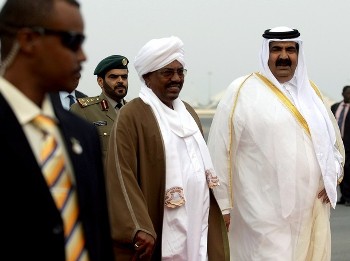Sudan’s Bashir makes it to Doha in defiance of ICC warrant
March 29, 2009 (DOHA) — The Sudanese president Omer Hassan Al-Bashir arrived in Qatar to attend the annual Arab League summit ending weeks of speculations on whether he will make the trip with a hypothetical risk of apprehension.

Hours before his arrival the pro-government Akhir-Lahza newspaper quoted a Sudanese senior foreign ministry official as saying that 2nd Vice President Ali Osman Taha will lead the delegation instead of Bashir.
The ICC row will top the agenda of the Arab League summit and the leaders are expected to endorse a resolution calling for annulling the arrest warrant and criticizing The Hague based court for making the move against Bashir.
It remains to be seen what wording of the resolution will be adopted. Yesterday the Sudanese state minister for foreign affairs Ali Karti was reported to be furious that the preparatory meeting of foreign ministers would not heed to his country’s demand on the position to be taken by the Pan-Arab body.
Khartoum wanted a “clear rejection” of the arrest warrant and dropping any references to pressing the UN Security Council (UNSC) on suspending the indictment.
“We want a clear rejection of the arrest warrant; trying to stop the decision [delaying it by using Rome Statue] is not what we want. The history of the Security Council and its resolutions against the country is known” sources speaking to Jordan Times quoted the minister as saying.
“It is better for us that the president gets chased by the Security Council rather than resorting to it. We do not want that,” he added.
Furthermore the Sudanese delegation wanted the summit to approve an emergency “solidarity summit” to be held in Khartoum immediately after the Doha one but diplomatic sources it is unlikely that the proposal would be adopted.
A proposal by Sudan for Jordan, Djibouti and Comoros Island to withdraw from their ICC membership was taken off the table as these countries said such a decision can only be made by the respective leaders.
According to media reports, the draft resolution will express “utmost rejection” to the ICC decision on the grounds that undermine Sudan’s peace and stability. Also it asserts that the arrest warrant against a sitting head of state “sets a dangerous precedent” and a “politicization of international justice”.
Earlier today the Libyan leader Muammar Kaddafi described the ICC as a court that “practices terror”.
The resolution also calls on Arab states “to evaluate their stances” with regard to the court and not to deal with the ICC arrest warrant in an apparent reference to the three states that ratified Rome Statute.
Furthermore it stresses the need to give a chance to the “independent and qualified” Sudanese judiciary to implement justice in Darfur and urges the UNSC “to carry out its responsibility for peace and security in Sudan”.
However some Arab states will likely seek to avoid a tough language that gives them little room for maneuver in terms of diplomatic initiatives. The Arab League has been lobbying the UNSC to invoke Article 16 of the Rome Statute that allows the council to suspend ICC prosecutions for a period of 12 months that can be renewed indefinitely.
Some Arab foreign ministers during the closed meeting also demanded that Sudan “to help them so they can be of help” and leave the door open for political and legal options to be in harmony with their demands of prosecuting Israeli leaders for abuses committed during the Gaza strip attack in January.
ICC members such as Jordan may also find it difficult to endorse provisions prohibiting cooperation with the court.
In recent days Jordanian officials said that they will respect their obligations under the Rome Statute despite being a member of the Arab League.
“We in Jordan wonder, how we would bring Israeli leaders to the ICC following the aggression on Gaza and demand non-execution of the court’s decisions?” a senior unnamed official told the Kuwaiti based Al-Jarida newspaper.
Resolutions by the Arab League are widely viewed in the region as nothing more but a public relations ones with little willingness to implement.
The head of Al-Arabiya TV channel based in Dubai Abdel-Rahman Al-Rashid wrote an op-ed in the Saudi owned Al-Sharq Al-Awsat newspaper saying that the Arab solidarity with Bashir “is no different than their semi-unanimous solidarity with Saddam [former Iraqi leader] six years ago”.
“Here we are today, the same Arab governments have embassies and ambassadors and goof relations with Baghdad and those who took over from Saddam and executed him”.
The UN Security Council (UNSC) adopted resolution 1593 under Chapter VII referring the Darfur case to the ICC despite Sudan being a non-member of the court.
The referral was based on a recommendation of the UN Commission of Inquiry that conducted investigations in Darfur and concluded that the Sudanese judiciary is unable or unwilling to prosecute the suspects.
Algeria, the only non-permanent member of the UNSC at the time abstained from voting on the resolution.
The issue of the ICC work in Darfur was largely unnoticed in Darfur until the ICC prosecutor announced last July that he presented a case against Bashir to the judges.
Human Rights Watch (HRW) issued a statement saying that the Arab League “should not reward Sudan’s behavior by supporting a suspension of Al-Bashir’s case, which would only encourage further abuses”.
The rights watchdog also criticized the Arab League for not bringing up Sudan’s recent expulsion of 13 aid groups from Darfur.
(ST)
